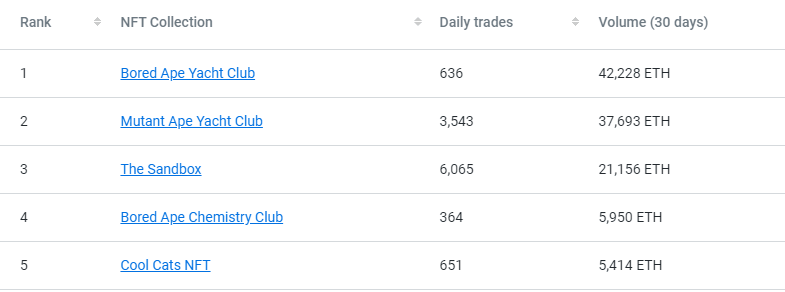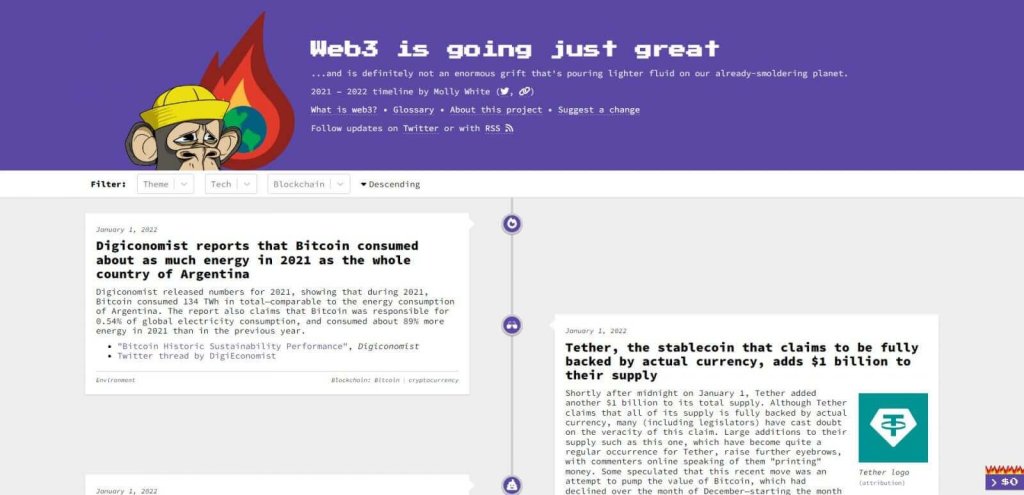Its come to my attention recently that a lot of people are chiming in to the Web3 debate. And, well, I thought I would give my $0.02c about it as well. Needless to say, it is hard to ignore this trend as a social media participant, as people are rushing to replace their profile photos with computer-generated apes and pixelated cats.
And if that wasn’t crazy enough, some of those pixelated cats can cost upwards of millions of dollars. If that isn’t a warning sign, then I’m not sure what is. Though, it would be unfair to judge the movement of Web3 solely based on the popularity of NFTs.
What exactly is Web3?
No one knows. Not even the people who have invested millions of Bitcoin and Ethereum in their digital art pieces know. No one knows what Web3 is because it lacks a clear definition.
Web3, also known as Web 3.0, is an idea for a new iteration of the World Wide Web that incorporates decentralization based on blockchains. Some technologists and journalists have contrasted it with Web 2.0, wherein they say data and content are centralized in a small group of companies sometimes referred to as “Big Tech”.
EN.WIKIPEDIA.ORG/WIKI/WEB3
The irony of Wikipedia calling Web3 an idea is not lost on me.
More importantly, Web3 – a term coined by Etheureum co-founder Gavin Wood – is based on the technology of cryptocurrency and blockchain.
Two extremely technical fields, which a normal human being won’t be able to understand without prior experience in cryptography or financial management. In fact, 99% of the people who have “invested” into Web3 (through NFTs or otherwise) could never explain why they are doing it, and how their investment will help Web3 to flourish.
For a lot of people, it is merely the gamification of gambling and high-risk investment. And I know this because I have seen my own friends fall trap for it.
But, to answer the question:
Web3 aims to use the technology of blockchain and smart contracts to create a decentralized experience of the Web. In such a world, each user owns a piece of their own Internet. So, rather than having Big Tech giants like Google and Facebook follow each of your steps: Web3, and decentralization promise to keep your identity intact. This is best seen through the lens of DeFi (decentralized finance) as the blockchain can protect users' identity, unlike banks.
It’s a narrow definition, albeit enticing, that is largely going to remain a daydream until we see simplified applications of it in real-world scenarios.
Web3 & NFTs: What’s the correlation?
We cannot talk about Web3 without talking about NFTs or Non-Fungible Tokens. Arguably, most people only know about Web3 because of these blockchain-based digital art pieces.

Yacht Club is right. Because no sane hard-working human being is going to spend $500,000 on a digital picture of an ape. Maybe if it cured a rare disease? Though, it seems to me that rather than curing a disease, NFTs are slowly but surely creating one.
The disease of scamming people out of money, and often doing it in broad daylight.
I highly recommend reading this article by Evan Armstrong: NFT Projects are just MLMs for Tech Elites, which goes into great detail about how NFT projects operate like pyramid schemes.
In fact, this goes beyond the opinion on labeling Web3 & NFTs as a scam. It is a straightforward fact. NFTs exist on a non-existing foundation of Web3. The big winners in this space are those who invested in cryptocurrency early and are able to afford to spend thousands if not millions of dollars on novelty art pieces. But what about people who are dragged into this space because they think they can get lucky and sell their digitized picture of a cat for a substantial profit?
Gary Vaynerchuk – a big proponent of NFTs and an owner of his own collection – has been quite transparent in advocating for people to be careful with investing in NFTs:
But, in this case, Gary is one of the very few who actually do advocate for cautiousness.
“Web3 is going just great” – a project by Molly White – highlights the pitfalls of crypto technology and its lack of foundation. But also showcases the hundreds of millions of dollars lost (stolen or otherwise) because of hacks, scams, and poor security practices.

As far as “get rich quick” schemes go, I have to say I am impressed with NFTs and their success.
There are arguments that suggest that NFTs can (or could) be used for transparent permission-based transactions in gaming, music, and so forth. But, it is difficult to find such projects up to this point.
In all fairness, some of these NFT projects could have real-world uses down the line.
But they have been completely overshadowed by shady marketing schemes and a barrage of people who have no idea how this technology is going to evolve.
And maybe it has to be this way.
Maybe Web3 and the NFT boom have to experience some kind of critical collapse for it to be rethought and restructured. In its current state, cryptography is like learning Sanskrit, and most people don’t want to burden themselves with learning a language that only a handful of people know how to use.
So, is Web3 a scam?
As it stands, the answer to this question is going to remain largely subjective. If you have invested in Web3 (whatever it may turn out to be), you’re more than likely to advocate that it is not. Whereas people who see no real-world application for Web3 are mostly going to say it is a scam.
While the market cap for cryptocurrencies is skyrocketing into the trillions of dollars, we have yet to see true government interference in this technology. Which, I believe, is going to be the first real pitfall and a test for how resilient this technology is to hold its own ground.
I will say that by no means am I discounting passionate people who work in this space. Blockchain and security is something I can advocate for. Because it has a promising future to help keep our digital identities sealed. This is interesting to me.
But in its current state, Web3 is as disorganized as it is complex and difficult to grasp. Why would the average citizen of the world care about strings of numbers, hash rates, proof of stakes, sharding, or digital inception of pixelated art?
Until these quirks are straightened out and divulged into common sense – I cannot see where Web3 can be either accepted or justified.
